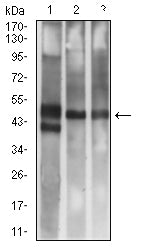
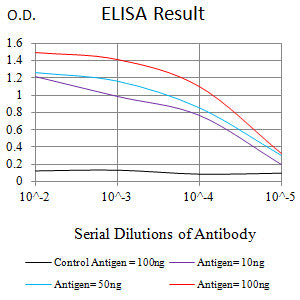
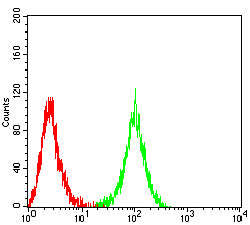
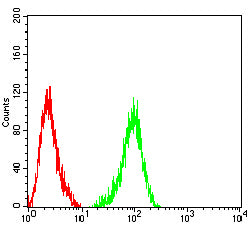
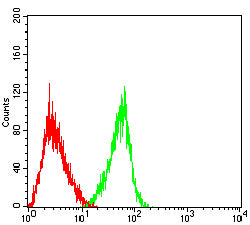
| WB | 1/500 - 1/2000 | Human,Mouse,Rat |
| IF | 咨询技术 | Human,Mouse,Rat |
| IHC | 咨询技术 | Human,Mouse,Rat |
| ICC | 技术咨询 | Human,Mouse,Rat |
| FCM | 1/200-1/400 | Human,Mouse,Rat |
| Elisa | 1/10000 | Human,Mouse,Rat |
| Aliases | KLRK1; KLR; NKG2D; NKG2-D; D12S2489E |
| Entrez GeneID | 22914 |
| clone | 3A7A2 |
| WB Predicted band size | 25.3kDa |
| Host/Isotype | Mouse IgG2a |
| Antibody Type | Primary antibody |
| Storage | Store at 4°C short term. Aliquot and store at -20°C long term. Avoid freeze/thaw cycles. |
| Species Reactivity | Human, Rat |
| Immunogen | Purified recombinant fragment of human CD314 (AA: extra 73-216) expressed in E. Coli. |
| Formulation | Purified antibody in PBS with 0.05% sodium azide |
+ +
以下是关于CD314(NKG2D)抗体的3篇参考文献,按文献主题分类整理:
1. **文献名称**:*NKG2D and its ligands in cancer immunotherapy*
**作者**:López-Soto A, et al.
**摘要**:探讨NKG2D(CD314)受体在肿瘤免疫中的作用,分析其抗体在增强NK细胞介导的肿瘤杀伤中的应用潜力,并讨论靶向NKG2D配体的治疗策略。
2. **文献名称**:*Structural basis for recognition of the non-classical MHC molecule HLA-E by CD94/NKG2A*
**作者**:Petrie EJ, et al.
**摘要**:解析CD314(NKG2D)家族受体(如NKG2A)与HLA-E分子结合的晶体结构,阐明NK细胞免疫识别机制,为设计靶向抗体提供结构生物学依据。
3. **文献名称**:*NKG2D deficiency exacerbates autoimmune disease in SLE-prone mice*
**作者**:Zhang J, et al.
**摘要**:通过小鼠模型证明CD314(NKG2D)信号缺陷会加重系统性红斑狼疮症状,提示其抗体可能通过调节免疫稳态影响自身免疫疾病进程。
注:CD314(NKG2D)相关研究多聚焦于肿瘤免疫治疗领域,上述文献覆盖基础机制、结构解析及疾病模型研究。实际应用中需结合具体研究场景筛选文献。
CD314. also known as NKG2D (Natural Killer Group 2D), is a C-type lectin-like activating receptor primarily expressed on natural killer (NK) cells, γδ T cells, and CD8+ αβ T cells. It plays a critical role in immune surveillance by recognizing stress-induced ligands such as MHC class I chain-related proteins (MICs) and UL16-binding proteins (ULBPs) on infected, malignant, or damaged cells. CD314 antibodies are tools or therapeutic agents targeting this receptor or its ligands.
Research on CD314 antibodies has expanded due to their dual role in immunity. In cancer, tumor cells often upregulate NKG2D ligands, making them targets for NK or T cell-mediated elimination. CD314 antibodies can block ligand-receptor interactions to study immune evasion mechanisms or enhance cytotoxicity by engaging NKG2D in immunotherapy. Conversely, in autoimmune diseases, overactivation of NKG2D pathways contributes to tissue damage, prompting development of blocking antibodies to suppress pathological immune responses.
Clinically, anti-CD314 antibodies are explored in oncology trials, either as standalone therapies or combined with checkpoint inhibitors. Diagnostic applications include flow cytometry or immunohistochemistry to assess NKG2D expression in immune monitoring. Challenges include managing ligand polymorphism and avoiding unintended immunosuppression. Overall, CD314 antibodies represent versatile tools for decoding immune regulation and developing targeted therapies.
×